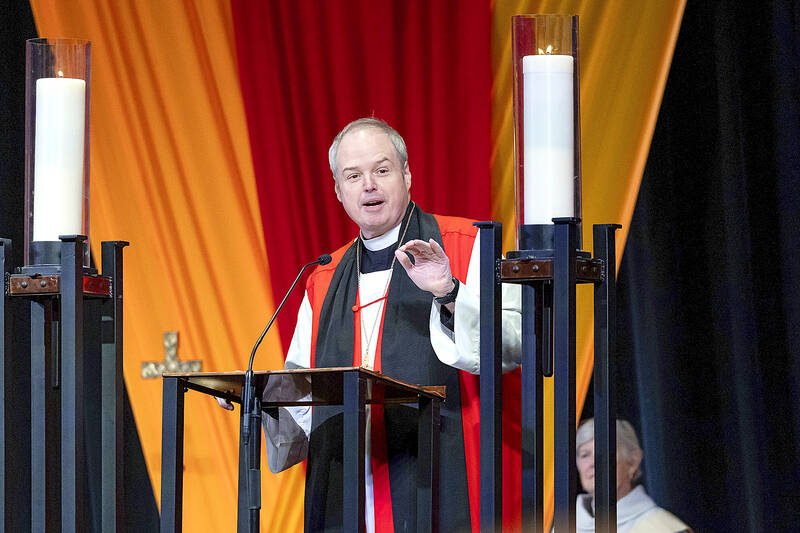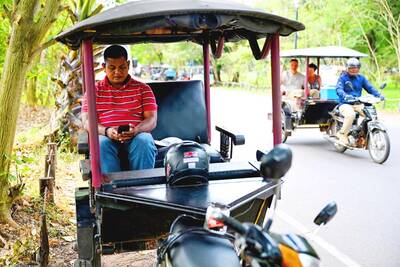The White House on Tuesday questioned the humanitarian commitment of the Episcopal Church after it refused to comply with a federal directive to help resettle South Africans granted refugee status by US President Donald Trump’s administration.
On Monday, about 50 South Africans arrived for resettlement in the US after Trump granted them refugee status as victims of what he called a “genocide,” a claim rejected by the South African government.
On Monday, the Episcopal Church said that it would end its refugee resettlement program with the US government rather than comply with the administration’s orders to help resettle the South Africans.

Photo: The Episcopal Church via AP
White House deputy press secretary Anna Kelly said in a statement that the church’s decision raised “serious questions about its supposed commitment to humanitarian aid.”
Afrikaners have “faced unspeakable horrors,” Kelly said.
Episcopal Church presiding bishop Sean Rowe was scathing in his criticism of the Trump administration’s decision to grant the South Africans refugee status.
“It has been painful to watch one group of refugees, selected in a highly unusual manner, receive preferential treatment over many others who have been waiting in refugee camps or dangerous conditions for years,” Rowe said.
Under eligibility guidelines published by the US embassy, applicants for US resettlement must either be of Afrikaner ethnicity or belong to a racial minority in South Africa.
The Episcopal Church said that it could not comply with Trump’s order “in light of our church’s steadfast commitment to racial justice and reconciliation.”
It said its programs with the US federal government would be wound up by the end of the fiscal year, but that its work on refugee resettlement would continue, including supporting recently arrived refugees from around the world.

The death of a former head of China’s one-child policy has been met not by tributes, but by castigation of the abandoned policy on social media this week. State media praised Peng Peiyun (彭珮雲), former head of China’s National Family Planning Commission from 1988 to 1998, as “an outstanding leader” in her work related to women and children. The reaction on Chinese social media to Peng’s death in Beijing on Sunday, just shy of her 96th birthday, was less positive. “Those children who were lost, naked, are waiting for you over there” in the afterlife, one person posted on China’s Sina Weibo platform. China’s

‘NO COUNTRY BUMPKIN’: The judge rejected arguments that former prime minister Najib Razak was an unwitting victim, saying Najib took steps to protect his position Imprisoned former Malaysian prime minister Najib Razak was yesterday convicted, following a corruption trial tied to multibillion-dollar looting of the 1Malaysia Development Berhad (1MDB) state investment fund. The nation’s high court found Najib, 72, guilty on four counts of abuse of power and 21 charges of money laundering related to more than US$700 million channeled into his personal bank accounts from the 1MDB fund. Najib denied any wrongdoing, and maintained the funds were a political donation from Saudi Arabia and that he had been misled by rogue financiers led by businessman Low Taek Jho. Low, thought to be the scandal’s mastermind, remains

Australian Prime Minister Anthony Albanese yesterday announced plans for a national bravery award to recognize civilians and first responders who confronted “the worst of evil” during an anti-Semitic terror attack that left 15 dead and has cast a heavy shadow over the nation’s holiday season. Albanese said he plans to establish a special honors system for those who placed themselves in harm’s way to help during the attack on a beachside Hanukkah celebration, like Ahmed al-Ahmed, a Syrian-Australian Muslim who disarmed one of the assailants before being wounded himself. Sajid Akram, who was killed by police during the Dec. 14 attack, and

VISHNU VANDALS: A Cambodian official accused Thailand of destroying a statue in a disputed border area, with video showing the Hindu structure being torn down The Thai military said ceasefire talks with Cambodia, set to begin yesterday, are expected to conclude with a meeting of the countries’ defense ministers on Saturday, as the two sides seek to end weeks of deadly clashes. The talks started at 4pm in Thailand’s Chanthaburi Province, which borders Cambodia. The Thai Ministry of Defense outlined several demands to be discussed ahead of the bilateral meeting of the General Border Committee (GBC) on Saturday. If secretariat-level discussions fail to reach agreement on key technical frameworks such as troop deployments, the Thai side would not proceed with the GBC meeting or sign any agreement on